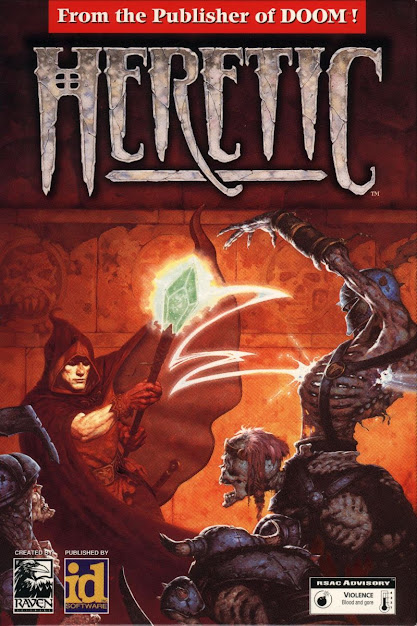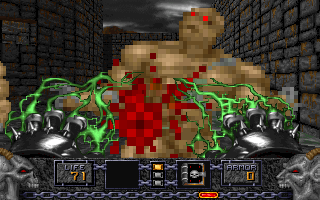Heretic is the fourth game released by Raven Software, a studio founded by Brian and Steve Raffel. With their debut game, an Amiga Dungeon Master clone called Black Crypt, John Romero of id took notice of them and the studios formed a partnership in which Raven would develop games based on game engines id created - ShadowCaster was built on the Wolfenstein 3D engine; Heretic and its sequel, Hexen, were made on the Doom engine; Hexen II on the Quake engine; and onward. Eventually Raven was bought out by Activision and sent to the slave mines to spend eternity working on Call of Duty sequels, but that's not important here.
Heretic's story is mostly conveyed in the manual, which tells us of the Sidhe, "an ancient elf race adept at arcane sorcery and keepers of the Tomes of Power." The Sidhe are attacked by three Serpent Riders from Hell, who begin forcibly converting everyone to a cult called the Order of the Sign, but the Sidhe are immune to the Serpent Riders' mind control, leading the Serpent Riders to brand them...HERETICS! The two more powerful Serpent Riders depart, leaving one behind the manage the situation on Earth and slaughter the Sidhe, but one Sidhe remains to continue the fight and that's you.
Upon starting the game, it immediately becomes clear that Heretic is effectively Doom with the knob cranked all the way to the Fantasy side of the meter. You run and fight monsters, find color-coded keys, and find the exit. Brian Raffel said the studio planned on Heretic being more of an RPG, as they were all D&D fans, but John Carmack advised them to just "do it like Doom, and add the fantasy flavor and other stuff." (This process of starting with something relatively complex and then stripping it down to make a simpler, action-heavy experience sounds a bit like how Wolfenstein 3D and Quake were made. Perhaps it was one of id's advantages in that their games didn't suffer from feature creep like many others but instead emphasized accessible, impactful gameplay.)
So Heretic became a Doom-like game, but with some expansions on the game engine. You could look and up and down (although the game still auto-aims for you if enemies are above or below), you got a modest item inventory, you could cast a flight spell, and by using a Tome of Power item you could gain powered up alternative-fire versions of the weapons. Most amusing is the morph ovum, a magic egg that turns monsters into chickens.
The weapons are all fantasy-based variations on Doom's arsenal. You start with a simple staff for melee attacks (instead of your fists) and a weak magic wand for a pistol. The crossbow is the shotgun equivalent, the Dragon Claw is the chain gun equivalent, etc. One of the more memorable weapons is the game's version of the chainsaw, a pair of magical gauntlets that send lightning into enemies at a touch.
The monsters, however, aren't precisely 1:1 Doom variations. There are flying gargoyles, golems, undead warriors, snakemen, flying wizards, etc. Some come in intangible "ghost" variations that can only be killed with particular weapons.
The game is often called a Doom clone in a somewhat pejorative way, like people recognize that it's fun but lament that it wasn't more unique, but the thing is that "D&D Doom" or "medieval Doom" or "fantasy Doom" is still Doom and therefore is still pretty good. Raven developed a reputation for making excellent action games, especially FPSs, and Heretic shows they had those talents from early on. Heretic has creative level design and the gameplay additions are interesting without overcomplicating the experience. The art design and audio are very good. It's maybe not quite as "heavy" as Doom in the sense of having a thrash metal edginess about it, but it set the stage for fantasy FPSs carrying more of the sword-and-sorcery feel going forward in its sequels and other games like Witchaven. When a fantasy FPS is made even today, people often compare it to Heretic and Hexen before anything else.






No comments:
Post a Comment